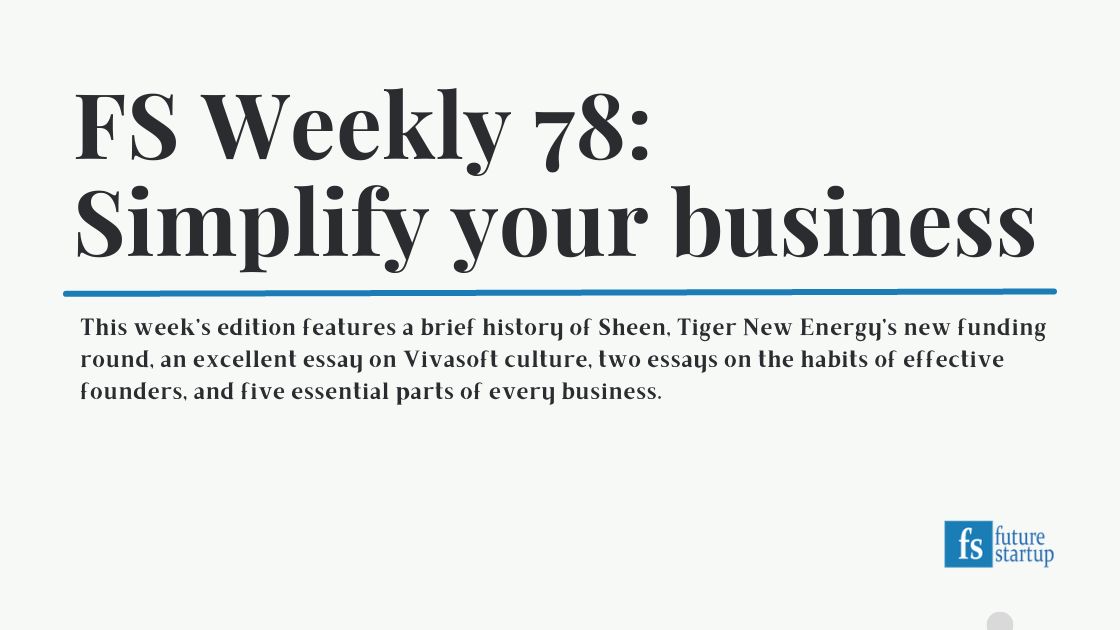
Hi there: I'm Ruhul and this is Future Startup Weekly, a newsletter about entrepreneurship, expertise, and doing good work.
Please let us know if you enjoy the newsletter and have any feedback for us to improve. You can read past issues here and subscribe here.
This week’s edition features a brief history of Sheen, Tiger New Energy’s new funding round, an excellent essay on Vivasoft culture, two essays on the habits of effective founders, and five essential parts of every business.
I’m continuing my reflections on Jim Collins’ management classics Good to Great. In the book, Collins asserts that great companies operate with an uncanny simplicity that can appear too literal to many people. He writes about a model he calls the Hedgehog concept at the intersection of three ideas as a tool to achieve operational and execution simplicity. I plan to write about the concept another day. Today, let’s see what simplicity looks like in practice.
Collins gives the example of American pharmacy chain giant Walgreens and how the company simplified its business, eventually leading to a good to great journey for the company.
Walgreens generated cumulative stock returns from the end of 1975 to 2000 that exceeded the market by over fifteen times, beating great companies such as GE, Merck, Coca-Cola, and Intel. The performance was remarkable more so because Walgreens was a relatively anonymous company operating in boring healthcare retail. Collins recalls an interview with Cork Walgreen, CEO of the company at the time, where he asked Cork to offer an insight into the extraordinary results.
From Good to Great: “Finally, in exasperation, he said, “Look, it just wasn’t that complicated! Once we understood the concept, we just moved straight ahead.” The concept was: to build the best and most convenient drugstores with high profit per customer. “That’s the breakthrough strategy that Walgreens used to beat Intel, GE, Coca-Cola, and Merck.”
The striking takeaway from that snippet for me is the simplicity of Walgreens’ metrics — build the best and most convenient drugstores and earn high profit per customer. Goals are easier to achieve when you know what you want and understand what needs to be done to achieve them.
Great businesses are extraordinarily simple. Find the things that you can be best at, relentlessly focus on them, and develop simple metrics to measure your success and failure.
Many companies unnecessarily complicate their business with an endless number of metrics. It is a clear mistake. You don’t need ten different metrics to know where your business is heading. Choose one metric, and focus on it relentlessly. Don’t chase many products on day one, find one thing where you have a significant advantage and do it better than anyone else.
This might sound simplistic but building a great business is not that complicated. It is just that sometimes we invent complexity to hide our incompetence and failure.
That’s about it.
Before going to today’s update, we’re looking for partners for 2024: Every week, 11,000+ founders, investors, operators, business, tech, and media professionals read FS Weekly. If you want to promote your product/services to our readers and support our work, you can now sponsor this newsletter. Details can be found here.
On to the updates.
Founded in China in 2008, SHEIN SHEIN is a global fashion ecommerce behemoth. From a small domestic retailer, it has risen to become a dominant force in the world of online fashion. This article tells a brief history of the company and its trajectory so far.
2. Tiger New Energy Raises $2.5M Seed Round
Tiger New Energy, a clean energy startup focused on delivering state-of-the-art battery-swapping technology to promote eco-friendly mobility solutions in Bangladesh, announced a $2.5 million seed round led by Wavemaker Partners and participated by several undisclosed international and local investors.
3. 07 Habits Of Effective Founders
Founding and leading a successful startup is a journey that demands much more than just a great idea. It requires a unique set of skills, traits, and habits that set effective founders apart from the rest.
4. The 05 Parts Of Every Business
In his widely acclaimed book The Personal MBA, Josh Kaufman presents a straightforward and accessible guide to understanding the intricacies of business without the need for a formal business education. Kaufman outlines the essential components that constitute the foundation of every business, a practical framework for understanding how businesses work.
5. Partner Story: Delivering Success Through Culture, The Vivasoft Way
Founded in 2016, Vivasoft Limited is a Dhaka-based technology company that provides IT consulting and software development services to both local and international businesses. Starting as a small operation with six people, Vivasoft has grown into a team of over 200 people within a span of seven years and has become one of the most prominent players in the burgeoning software industry in Bangladesh. The company serves as an excellent case study of how the right culture can put a company on an extraordinary and sustainable growth trajectory.
You can learn more about our partner program here.
That's all for this week.
If you enjoy reading Future Startup, please share it with other people who might find it inspirational and educational.
We’re looking for partners for 2024: Every week, 11,000+ founders, investors, operators, business, tech, and media professionals read FS Weekly. If you want to promote your product/services to our readers and support our work, you can now sponsor this newsletter. Details can be found here.
Thank you for reading.
Ruhul
On behalf of Team FS
